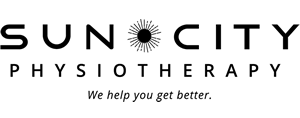Hockey Injuries
Every Fall, thousands of Okanagan hockey players return to the local rinks. Although most will have a great year of pain free hockey, many will suffer an injury during the season.
The most common types of lower body hockey injuries suffered are to the groin and hip flexor muscles. These muscles cross the hip joint from the pelvis and either pull the thigh across the midline of the body (adduction) or upward into flexion. A certain amount of hip rotation also occurs during this. These actions are key movements during skating. They occur when pulling the leg back under your body, prior to push off or when turning and performing crossovers. These same muscles are also under stress when used to control end-range extension and abduction (hip movement away from midline of the body) during the push phase of the stride. In fact, it is during this controlled muscle lengthening (eccentric contraction) that the muscle most commonly fails and a strain occurs. These important muscles are also used to stabilize the body during shooting, brace during body contact, and when a player slips or catches an edge.
Hip strength imbalances, decreased hip mobility, poor core/trunk stability, and lack of a good dynamic warm up have all been associated with increased risk for these injuries. The age of the athlete and a previous hip injury are also predictive factors. An athlete can’t change their age or go back in time and erase a previous injury, but they can be proactive about the other factors.
Research suggests that hip adductor (groin) strength should be no less than 80 percent of abduction strength (outer hip muscles). This can be worked on by including hip exercises such as lunges that step into 45 degree quadrants and lateral directions as well as forward and back (lunge matrix). I also like the use of the lunge matrix because it works on hip mobility and hip stability in positions your hip often gets into during hockey. You can also focus on your core stability during these movements. Training your trunk to stabilize during the skating and shooting motion is paramount.
A dynamic warm up is a series of sport specific movements that are designed to prepare the muscles for use and are performed in a safe controlled fashion. In hockey these can include movements such as squatting, lunging and high knees to name a few. With the hockey teams I work with, I will often go through a series of 10 to 15 movements off ice before getting equipment on. As a Physiotherapist, my personal routine is to usually target a few specific movements by performing air squats and lunges with rotation in the dressing room prior to lacing up my skates.
Even with the best prevention, an injury can still occur. Hockey is an explosive game with quick changes of direction and plenty of incidental contact. If you do suffer an injury to the groin region that you think is a strain, I suggest you ice the injured area for the first couple days and abstain from pain provoking activities. You should not return to skating until you can walk and lunge without pain. Optimally, you should make your first session back a skating only session and not put yourself into a game until you know you can tolerate skating. If you do have pain that does not settle in a couple days, or you experience other symptoms such as pain with coughing, or numbness into your groin, you should have it assessed by your doctor or Physiotherapist. There are other conditions that can occur in the region that are more serious than a muscular strain and these should be ruled out. Recovery from injuries to the groin can take anywhere from 3 to 5 weeks and they have the potential to become chronic if not treated properly.
If you suffer from this type of injury, talk to your Physiotherapist about the best course of treatment so you can get back on the ice sooner.
The most common types of lower body hockey injuries suffered are to the groin and hip flexor muscles. These muscles cross the hip joint from the pelvis and either pull the thigh across the midline of the body (adduction) or upward into flexion. A certain amount of hip rotation also occurs during this. These actions are key movements during skating. They occur when pulling the leg back under your body, prior to push off or when turning and performing crossovers. These same muscles are also under stress when used to control end-range extension and abduction (hip movement away from midline of the body) during the push phase of the stride. In fact, it is during this controlled muscle lengthening (eccentric contraction) that the muscle most commonly fails and a strain occurs. These important muscles are also used to stabilize the body during shooting, brace during body contact, and when a player slips or catches an edge.
Hip strength imbalances, decreased hip mobility, poor core/trunk stability, and lack of a good dynamic warm up have all been associated with increased risk for these injuries. The age of the athlete and a previous hip injury are also predictive factors. An athlete can’t change their age or go back in time and erase a previous injury, but they can be proactive about the other factors.
Research suggests that hip adductor (groin) strength should be no less than 80 percent of abduction strength (outer hip muscles). This can be worked on by including hip exercises such as lunges that step into 45 degree quadrants and lateral directions as well as forward and back (lunge matrix). I also like the use of the lunge matrix because it works on hip mobility and hip stability in positions your hip often gets into during hockey. You can also focus on your core stability during these movements. Training your trunk to stabilize during the skating and shooting motion is paramount.
A dynamic warm up is a series of sport specific movements that are designed to prepare the muscles for use and are performed in a safe controlled fashion. In hockey these can include movements such as squatting, lunging and high knees to name a few. With the hockey teams I work with, I will often go through a series of 10 to 15 movements off ice before getting equipment on. As a Physiotherapist, my personal routine is to usually target a few specific movements by performing air squats and lunges with rotation in the dressing room prior to lacing up my skates.
Even with the best prevention, an injury can still occur. Hockey is an explosive game with quick changes of direction and plenty of incidental contact. If you do suffer an injury to the groin region that you think is a strain, I suggest you ice the injured area for the first couple days and abstain from pain provoking activities. You should not return to skating until you can walk and lunge without pain. Optimally, you should make your first session back a skating only session and not put yourself into a game until you know you can tolerate skating. If you do have pain that does not settle in a couple days, or you experience other symptoms such as pain with coughing, or numbness into your groin, you should have it assessed by your doctor or Physiotherapist. There are other conditions that can occur in the region that are more serious than a muscular strain and these should be ruled out. Recovery from injuries to the groin can take anywhere from 3 to 5 weeks and they have the potential to become chronic if not treated properly.
If you suffer from this type of injury, talk to your Physiotherapist about the best course of treatment so you can get back on the ice sooner.

Jay is a graduate of the University of British Columbia’s School of Rehabilitation Medicine class of 1994. He spent five years working in the United States in various Sports and Orthopaedic settings, and as a member of Health Volunteers Overseas taught and practiced Physiotherapy in South Africa and the West Indies during the mid- to late nineties.
